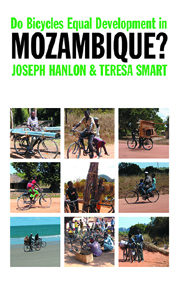Book contents
- Frontmatter
- Contents
- Acknowledgements
- The authors
- Money & measurements
- Abbreviations, acronyms & glossary
- Part I IS THERE DEVELOPMENT IN MOZAMBIQUE?
- Part II ACTORS & CONTEXT
- 9 Frelimo & the democratic one-party state
- 10 Corruption, rent-seeking, reform & a divided elite
- 11 Aid dependence & subservience: carrots & sticks
- 12 On the edge of the world
- Part III ALTERNATIVES & THE DEVELOPMENTAL STATE
- Appendix 1 Aid
- Appendix 2 Investment & other tables
- Bibliography
- Index
10 - Corruption, rent-seeking, reform & a divided elite
from Part II - ACTORS & CONTEXT
Published online by Cambridge University Press: 05 April 2013
- Frontmatter
- Contents
- Acknowledgements
- The authors
- Money & measurements
- Abbreviations, acronyms & glossary
- Part I IS THERE DEVELOPMENT IN MOZAMBIQUE?
- Part II ACTORS & CONTEXT
- 9 Frelimo & the democratic one-party state
- 10 Corruption, rent-seeking, reform & a divided elite
- 11 Aid dependence & subservience: carrots & sticks
- 12 On the edge of the world
- Part III ALTERNATIVES & THE DEVELOPMENTAL STATE
- Appendix 1 Aid
- Appendix 2 Investment & other tables
- Bibliography
- Index
Summary
At independence in 1975, the new government did not replace the old colonial banknotes and coins. Then on Sunday night 15 June 1980, President Samora Machel announced on the radio that the old ‘escudo’ would be replaced, one for one, by a new ‘metical’, over the following three days. Money in bank accounts was converted automatically, but cash had to be changed at banks or, in rural areas, mobile change centres.
We were working in Mozambique then and have strong memories of the change-over. One of us, Teresa Smart, was then a teacher at the Industrial Institute in Maputo. She picks up the story:
To reduce the number of people in the bank queues, people with jobs were encouraged to bring their money into the workplaces and one person would queue for them all. On Monday the office manager told us all to bring in our money the next day, and we did. I handed in about a month's salary as did 40 other people, and he went to queue at the bank. It was late when he reached the front of the queue, so he took the bag of new money home and gave it to us the next day. No one thought it was strange. This was what Samora told us to do. Everyone knew that anyone walking away from a bank had a huge pile of money. Yet we heard no stories of people being robbed.
- Type
- Chapter
- Information
- Do Bicycles Equal Development in Mozambique? , pp. 101 - 118Publisher: Boydell & BrewerPrint publication year: 2008

